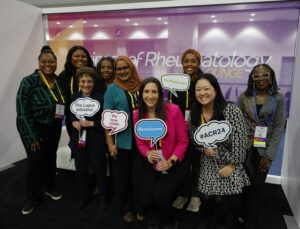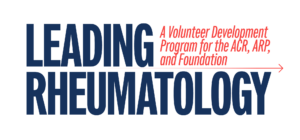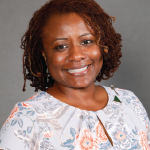
Volunteers supporting the Collaborative Initiatives Special Committee (COIN) at ACR Convergence 2024. (Click to enlarge.)
Who is the newest ACR, ARP or Rheumatology Research Foundation volunteer? Hopefully you. Volunteers, working side by side with staff, move the ACR forward. They are the voice through which our mission is put into action, ensuring we meet our members’ goals. Developing an effective pipeline of future volunteer leaders is essential to the future of the ACR, the ARP and the Foundation. If you are passionate about creating effective change for rheumatology patients and the providers who treat them, you can help us shape the future of rheumatology by becoming a volunteer.
Opportunities Abound
Volunteer roles encompass a diverse range of activities. The ACR has 23 different, standing committees, each of which addresses a unique and important aspect of the practice and profession of rheumatology.
Many people equate involvement in ACR as serving on a committee or the Board of Directors, but these are—by no means—the only volunteer opportunities. Other examples include serving on a working group, task force or subcommittee, or a taking part in advocacy or working on a guideline development team. My own volunteer activity began with reviewing abstracts for the annual meeting, which was followed by service on different subcommittees. Volunteering can occur in many different ways, all of which provide value to the College and can be meaningful to the individual.
Frequently Asked Questions
What is involved in being a volunteer? Here are a few questions I commonly hear:
I have never been involved with the ACR. Is it too late for me to be a volunteer? Definitely not. Engagement in volunteering can happen at any time that is right for you. The ACR appreciates that life’s responsibilities will wax and wane during the course of a career. If an opportune time arises, no matter when that happens, it is never too late to volunteer.
Does volunteering take a lot of time? Time requirements vary greatly and depend on the volunteer position. Although the typical participation term for committee members is three years, other volunteer activities have minimal time requirements or a short duration limited to achieving a specific goal. With electronic capabilities now in place, travel for in-person meetings has been markedly reduced and, for some activities, may not be required at all.



